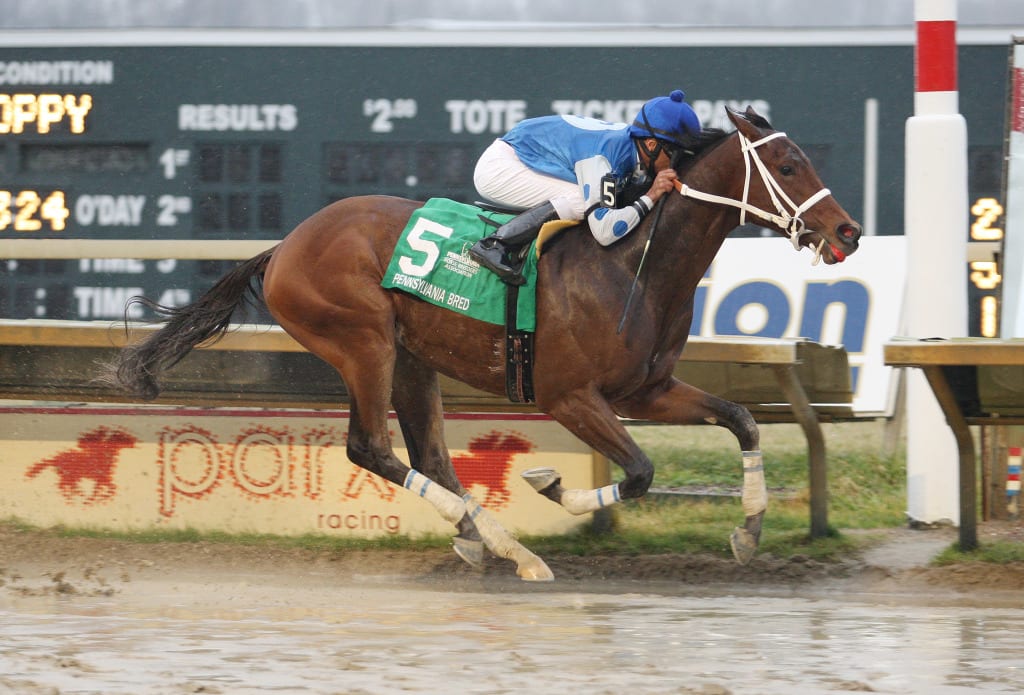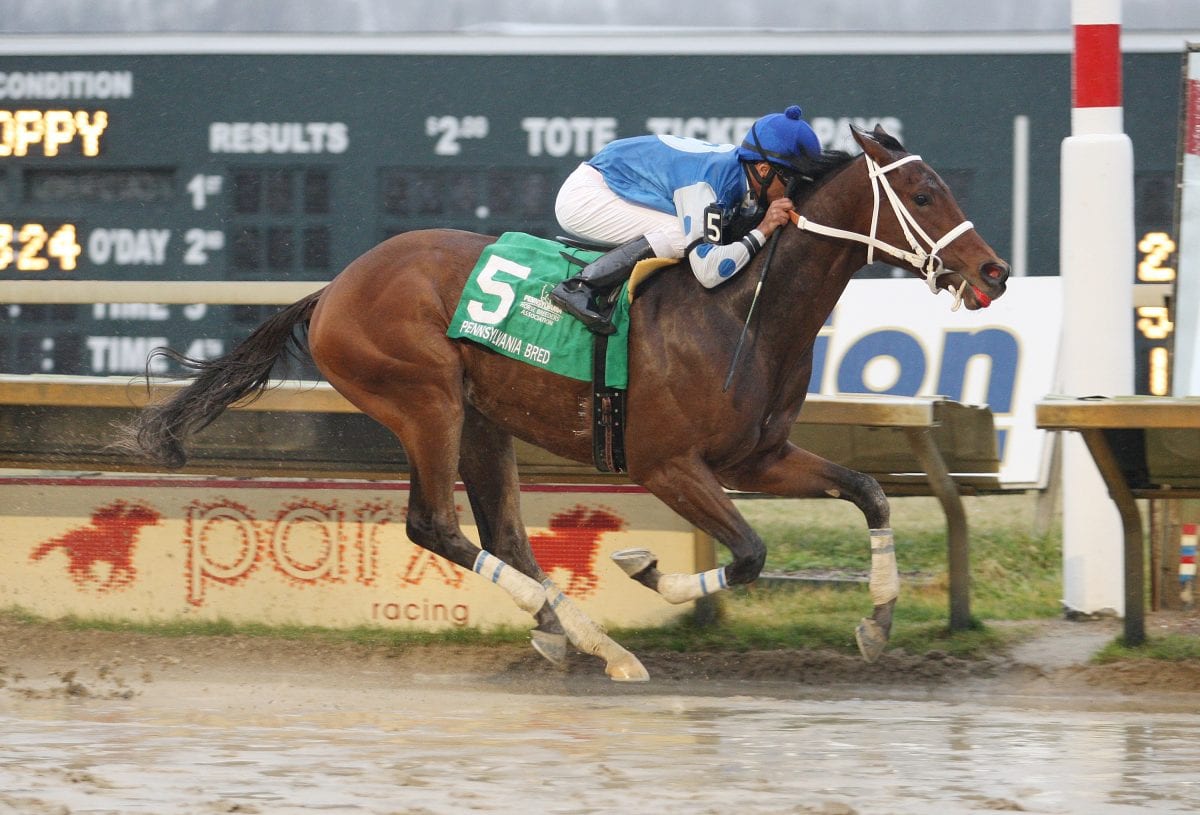
Parx Racing will run 26 percent fewer days next year than are scheduled for 2015. Photo By Bill Denver / EQUI-PHOTO
by Linda Dougherty
For the first time in at least 30 years, Parx Racing will not run a year-round schedule in 2016.
Under a three-year deal inked between the Pennsylvania Thoroughbred Horsemens’ Association (PTHA) and Parx management, the Bensalem oval will run 153 days next year, down from this year’s 210 dates.
The reduction in dates is believed to be a pre-emptive strike in advance of Senate Bill 900, which would allow Category 1 license holders (racinos) to reduce racing dates to a minimum of 100 per year, and allows each track to have up to four non-primary locations with up to 250 slot machines.
Money from the non-primary locations would go into the state’s General Fund, not into the Race Horse Development Fund. The bill also proposes Internet gaming, which also will not be tied to horse racing.
Interestingly, among the legislators who introduced SB 900 is Robert “Tommy” Tomlinson of Bensalem, Pa. Tomlinson was instrumental in getting the original slots legislation passed in 2004.
The three-year deal calls for Parx to close December 23 through February 13, and the entire month of August. Parx will keep the track open for training during those dark periods, and it will invest $4.4 million in racetrack infrastructure and property improvements.
To compensate horsemen for the loss of racing opportunities, the track will present a “Fall Festival” in September and October, in which purses will be doubled to nearly $500,000 a day. The purse money will come from the 2016 winter dates that will be cancelled. Local horsemen will be given preference at the entry box; if a horse stabled on the grounds wins a race during that time, it will earn 15 percent more.
In 2016, it’s possible that one month in the spring will offer the doubled purses, and one month in the fall.
“It’s a done deal,” said one PTHA Board member in advance of the meeting. “We all signed it at the last meeting. After 2018, who knows what will happen?”
At a general membership meeting on the backstretch this morning held by the PTHA’s Mike Ballezzi, most horsemen were supportive of the changes, with only one person, a Board member of the Pennsylvania Horse Breeders Association, voicing her displeasure at the deal, sources said.
Kate DeMasi, a PTHA Board member and a longtime leading trainer at Parx, said that the deal took a lot of work by Ballezzi and PTHA head Sal DeBunda, and that the general feeling is that the horsemen have steered their own destiny, rather than been forced into something by legislators and/or Parx.
“Unless we have a mild, El Nino winter, it’s inevitable that we lose days during January and February anyway,” said DeMasi, who cited one drawback being the cost of pre-racing a horse, only to find out racing is cancelled. “We’re going to have a place to train with no day rate cost, horsemen can freshen their horses or go to Florida if they like, we’ll keep our pension and healthcare benefits, and we’re going to present a two-month ‘boutique meet’ in which purses will be high and fields will be full, good betting races. I think it’s going to be great.”
This year, Parx will close the last eight days of August in order to let the track prepare the surface/turf course for the “Fall Festival,” and also to let horsemen have time to cycle their horses into the rich races.
In other legislative news, on June 22 the Senate approved legislation that makes a number of changes to the state’s oversight of the horse racing industry. One major change dissolves the separate state commissions under the Department of Agriculture for thoroughbred and harness racing in favor of a single oversight commission.
Senate Bill 352, whose prime sponsor was Senator Elder Vogel, now goes to the House of Representatives for consideration.
“My bill also makes a number of necessary changes to licensure, fines, fees and the pari-mutuel tax structure to properly fund regulatory oversight and drug testing,” said Vogel in a statement.









This was long overdue! Considering MD only has 149 live racing days in 2015, this move makes a whole lot of sense for racing in the Mid-Atlantic. Just wondering if Penn National will continue to run about the same number of days in 2016 as they have been in recent years?
BUT- the questions remain – Will MD or DEL be able to maintain their current number of days ? CT – cuts MNR – cuts PRX- cuts CNL – closed SUF- closed.
What about all the people this is putting out of work? My husband has worked hard in this ‘failing industry” as a groom for the past 40 years, since he was 12 years old in Mexico ( he is now an American citizen and has been since 1990). He has worked hard as a groom for most of his life. This is going to hurt our already fragile financial situation. Once again the ‘fat’ cooperation’s win. Although, debatilvly, this will compensate the Trainers and owners by instituting the Fall Festival ( which IMO is/was a joke-because the large purses drew many better horses from all over, thus making the races a lot tougher to win).Cutting race days isn’t going to help the ‘lower’ echelon, the very poor working vlass of horseman foing a lot of hard work for minimal pay, and long hours.
it is nice that the trainers can ship ,or go to Florida, but what about the workers, the ones who are breaking their backs day after day, And living habnd to mouth. Where do they go.
And as far as Kate’s saying it is going to be good unless we have a El Nino ‘ winter..well, Miss Kate that’s just what we are going to have. Are you or any other trainer, going to compensate you workers for lost stake money which many of us rely on? Or are you or any other trainer going to pay extra money and travel ( food money, compensation for long hours shipping) for your grooms and hot walkers who will be shipping?
IMO this is just the beginning of the end of racing at Parx.
I would like for someone to explain the benefits to the racing industry of the hyperactive claiming activity at mid-atlantic tracks. The truth is that the bargain claiming prices, at 1/3 to 1/2 of purses put forth by the racing offices, are a direct subsidy to the claiming barns and are funded by the breeder/owners or the cients who buy their young horses.
I defy anyone to demonstrate how a breeder can carry a mare, pay a stud fee, and raise and train a foal to a competitive race horse for the puny claiming prices in the region. As a result we have seen foal crops across the region in free fall and the cliff is at hand.